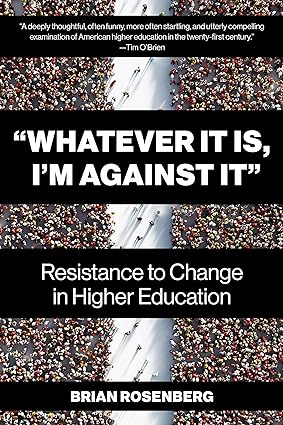
If I had $3610 I wanted to get rid of quickly, I'd buy a hundred copies of this book and gift them to key figures associated with the University Near Here: the president, trustees, appropriate legislators, department chairs, etc. (Maybe with instructions on what parts would be better ignored.)
The author, Brian Rosenberg, was a longtime president of Macalester College, out in St. Paul, Minnesota, and his experiences there qualify him for commentary on the challenges faced by colleges in an era of declining enrollment (and, I'd add, increasing irrelevance). The book's title, of course, is taken from the song sung by President Wagstaff (Groucho Marx) in the classic movie Horse Feathers. (You can see the movie clip here, you're welcome).
The book's overall argument is summed up in a quote I once heard (and unfortunately can't find anymore) to the effect that the political leanings of college faculties are heavily to the left; but when it comes to the governance of their own institutions, they become extremely conservative. Innovation is resisted, producing stasis in the face of crisis. And a system that fails a significant fraction of its customers/students, but saddles them with (you may have heard) piles of debt.
Rosenberg tells his story with punchy prose and humor (and, occasionally, a taste of bitterness). On lecturing:
Consider, for example, the lecture, "the style of teaching that has ruled universities for 600 years." 600 years ago, barbers were still performing surgery. Scott Freeman […] traces the history of the lecture back even further to 1050, when universities were founded in Western Europe and when barbers were just starting to perform surgery.
Or:
The largest and most influential universities in the United States combine undergraduate and graduate teaching with research institutes, hospital systems, professional schools, semiprofessional sports teams, major real estate holdings, and who knows what else. In some sense Harvard is like Pfizer with a football team, bringing together under the same brand multiple activities that have little or nothing to do with one another.
Another telling point: US News and World Report started ranking colleges in 1983. Top five then: Stanford, Harvard, Yale, Princeton, Berkeley. Their latest top five: Princeton, MIT, Harvard, Stanford, Yale.
Contrast this with the Fortune 500. In 1983, their top five were: Exxon, GM, Mobil, Texaco, and Ford. The most recent: Walmart, Amazon, Exxon Mobil, Apple, and United Health Group.
Whatever their faults, private companies prosper via innovation and competition, and the result is perpetual churn. Universities do not. Rosenberg notes that the incentives are all wrong for them; they have no reason to experiment. As Rosenberg notes, the odds of success are low, the price of trying is high. UNH is never going to vault into the US News top five, and (unless something very unexpected happens) Harvard is never going to leave.
Another quote:
Regardless of the fact that nearly every presidential job description and nearly every presidential search committee speaks to the desire of a "change agent," the truth is that an actual change agent is something that only the most desperate college communities want—and even the desperate ones are not sure about it.
Rosenberg's great on his theme… and, unfortunately, awful when he strays off it. His discussion of faculty tenure (another barrier to reform) wanders into "academic freedom"… and then falls into the pit of First Amendment issues. According to Rosenberg, all that free expression stuff can be "the right simply to act like a jerk." His footnoted "good example" of that is Stuart Reges, a computer science facule at the University of Washington. When encouraged by the unversity administration to include a "Native American land acknowledgement" on his syllabus, he went this way:
I acknowledge that by the labor theory of property the Coast Salish people can claim historical ownership of almost none of the land currently occupied by the University of Washington.
As you can imagine, the excrement hit the air circulation device. It escalated into a legal issue, and I encourage you to read the discussion at the Foundation for Individual Rights and Expression (FIRE) site. Make your own call about whether Rosenberg is being fair or accurate about this being a case of "the right simply to act like a jerk."
That caused me to look up Macalester College on FIRE's Free Speech Rankings. It is in position #211, with a "Below Average" speech climate. Reader, that's not far from the bottom (currently occupied by Harvard, at #248).
Rosenberg also takes a number of drive-by swipes at various conservatives/libertarians. "Drive-by" in the sense that they don't contibute anything to his overall thesis, and seem to serve mainly as signals to his (presumably leftist Democrat) tribe: "Don't worry, I'm not one of them, I'm one of you."
So: ignore that, and the book's pretty good. In the final chapter he outlines possibilities for reform, identifying six "long-standing and widespread assumptions" about higher ed: (1) "The faculty are the university." (2) "Higher education is a meritocracy." (3) "The university stands 'at a slight angle to the world.'" (4) "Students need a major." (5) "Offer lots of different stuff." (6) "Higher education can't change."
It probably has to change.
![[The Blogger and His Dog]](/ps/images/me_with_barney.jpg)



